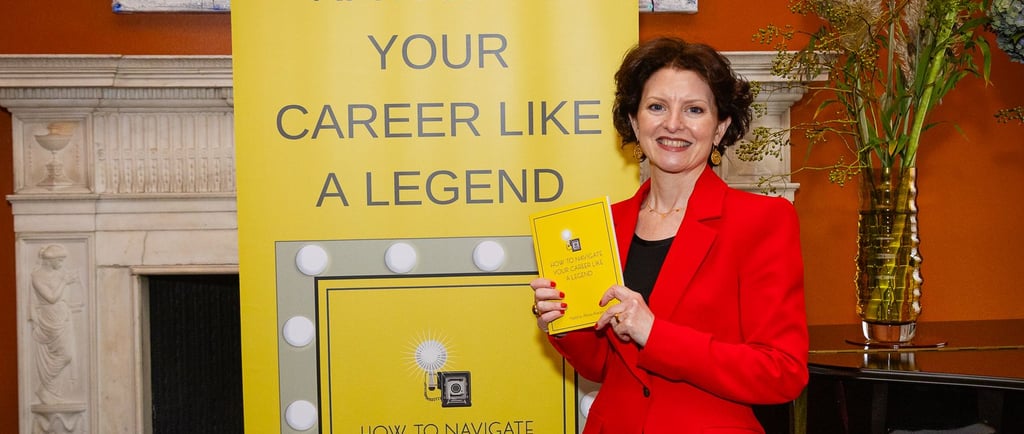Book Review: How to Navigate Your Career Like a Legend
Book Review: How to Navigate Your Career Like a Legend by Natalie Abou-Alwan
Paul Carter
10/18/20255 min read


Yellow, short, easy to read, fits in my bag and a welcome break from my phone as I travel on the train to work. Unlike my straight-line journey to the office, How to Navigate Your Career Like a Legend by international lawyer Natalie Abou-Alwan reflects the trending dialogue on squiggly careers.
And so it begins…‘I am not a trained writer. I am a lawyer. A working professional who, probably like you, has observed the general goings-on in the office, across boardroom tables and during commercial negotiations, at home and abroad.’
This engaging career companion guide covers office politics, sisterhood, networking, corporate hierarchies and cold, hard truths about the career ladder as you move up, sideways, get stuck and sometimes go down before you rise again. It’s about Natalie’s career but not about her, it’s more about you and how her experiences mirror yours or can inspire you.
It unfolds across 99 pages and while I am resisting the urge to quote the infamous Jay Z song out of respect for women, the book is full of pop culture references to paint pictures in your mind. ‘We are all of us stars, and we deserve to twinkle,’ said Marilyn Monroe and Eleanor Roosevelt said, ‘No one can make you feel inferior without your consent.’ Elvis, Dynasty, Clark Gable, Freddie Mercury, Frank Sinatra, Judy Garland, The Wizard of Oz and Clint Eastwood all get a mention.
It reminds me of the 1998 film Out of Sight with George Clooney and Jennifer Lopez. The cool, jazzy soul soundtrack and the car boot scene with this dialogue about marriage that could be ascribed to careers too. ‘It was just a year, give or take a few days. I mean, it's not like we didn't get along or anything. We had fun, we just didn't have that... that thing, you know? That spark, you know what I mean? You gotta have that.’
I liked this excerpt from the book: ‘Insecurity is usually fear-based. Performers who face their fears, often go on to exceed their goals, working through their fear, by training, learning and better understanding themselves.’ Especially as it leads to the ugly side of insecurity which creates toxic behaviours such as the slammer who shuts people down, the under-carpet sweeper to reduce and withhold oxygen from the employee voice, and the gossip denier and propagandist who purposely undermine people and manipulate others.
No matter how tempting the deal, make sure you can still look yourself in the mirror and always take the stairs. To promote her book, Natalie kindly answered my questions.
Q1) Now you have written your book, do you feel confident to call yourself a writer and illustrator?
I am still not completely confident in calling myself a writer, as this is just one book and written about experiences I am very familiar with. However, strangely, I am more confident in calling myself an illustrator, as there seems more freedom for creativity and expression when drawing.
Q2) How long did it take to progress from wanting to write your book to writing your book?
Two to three months. Some of the chapters were originally written as published articles, so creating more just felt like building out the story. The illustrations came more as an afterthought. I am quite a visual person, so as I wrote each chapter (which can take anything from between two to five hours), I started to imagine a condensed version of the content in my head. I wanted this book to be engaging and fun to dive into, so rather than going to an illustrator, I decided to do this myself as I knew exactly what I wanted.
Q3) Did seeing / witnessing office bullies / office politics and other difficult experiences act as a bigger motivator than good times in writing the book?
Definitely! As I always say, you learn more from challenges and setbacks than when things go smoothly and to a script.
Q4) If aspiring authors want to write books to expose bullies and difficult times at work, how can they legally describe what they say happened? What should they avoid writing?
Throughout my book, I consciously kept away from naming names in the more negative examples of behaviours. Sometimes there are specific examples about a specific person, but I have not named them. Mainly I have tried to merge "types" of behaviours across people and companies, to steer well away from even the potential of a defamation claim, even though this type of claim requires the description to be false, or to be likely to cause serious reputational harm.
Q5) What are the ups and downs of sisterhood in the workplace?
In theory, there are only "ups" to a sisterhood in the workplace. Where I have seen this work successfully is where it is authentic - not part of a women's network where most of the members are only there because it was suggested to them that it might enhance that person's reputation or where it is only used as a tool to get known within or outside of an organisation. Women need to want to help other women, just as with any other type of minority group. If the want is not there, then it is inauthentic and useless. Most of the examples of true sisterhood that I have seen are done on a much more informal basis - smart women in the workplace recognising talent in each other and wanting to help each other reach full potential.
Q6) How should people process setbacks? Is it healthy to bear a grudge or take work problems personally?
I think it is only healthy to allow yourself time and space to process setbacks. If you leave these to be ignored, or brushed under the carpet, they will come back and bite you later. Setbacks often come as a shock and there is often politics involved, sometimes that you may only be aware of in hindsight, so it is hard not to take things personally, especially at first. Once the initial shock and upset is worked through, I would recommend saving your energy to keep focussed on what you want, to keep working hard and to find other ways to gain the experience that setback (for example a promotion you might not have got), would have given you by stepping out of your comfort zone and increasing your network. Some great advice I was given when dealing with a setback was "Remember everyone will be watching how you behave and how you deal with this." My advice would be, show "them" that you are resilient, keep your work ethic strong and find other ways to gain the experiences and know-how you need for your next win.
Q7) Your entertainment / celebrity quotes remind me of the film Out of Sight (1998) which has the famous time out scene between George Clooney and Jennifer Lopez. If you could take a time out and wished you had said something to make your career better, what would you have said?
I have not seen Out of Sight, so I am not familiar with the time out scene, sorry! However, if I could have taken my own time out, especially earlier in my career, I wished I would have said to myself: "Don't listen to them. They have their own insecurities, which have nothing to do with you. Keep focussed and know your worth."
Do you take the stairs at work?
Haha, usually I do. However, if I am scheduled for back-to-back meetings in different locations within a building, I do take the lift to ensure I get to my next meeting on time!
Inspiration
What we talk about when we are working and living
© 2025. All rights reserved.
